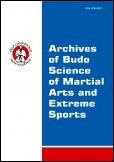2016, Volume 12, Issue 1
Stress and anxiety disorders – prognostic significance of various biochemical indicators in combat sports athletes
Elżbieta Piskorska1, Jan Mieszkowski2, Andrzej Kochanowicz3, Łukasz Sielski4, Bartłomiej Niespodziński5
1The Faculty of Pharmacy of NCU Collegium Medicum, Department of Pathobiochemistry and Clinical Chemistry, Nicolaus Copernicus University Collegium Medicum, Bydgoszcz, Poland, Bydgoszcz, Poland
2Faculty of Physical Education, Health and Tourism, Institute of Physical Culture, Kazimierz Wielki University in Bydgoszcz, Poland, Bydgoszcz, Poland
3Faculty of Physical Education, Department of Gymnastics and Dance, Gdansk University of Physical Education and Sport, Gdańsk, Gdańsk, Poland
4Department of Maternal-Fetal Medicine, Gynecology and Neonatology , Collegium Medicum, Nicolaus Copernicus University, Bydgoszcz, Poland
5Faculty of Physical Education, Health and Tourism, , Institute of Physical Culture, Kazimierz Wielki University in Bydgoszcz, Poland, , Bydgoszcz, Poland
Author for correspondence: Jan Mieszkowski; Faculty of Physical Education, Health and Tourism, Institute of Physical Culture, Kazimierz Wielki University in Bydgoszcz, Poland, Bydgoszcz, Poland; email: mieszkowskijan[at]ukw.edu.pl
Full text
Abstract
Anxiety and stress are surprisingly common, both in general population, and in relation to elite athletes, especially in combat sports. The aim of this paper is the usefulness of changes in physiological during diagnostic procedures of anxiety disorders and stress in combat sports athletes, on the basis of the available literature reports. Particular attention was paid to variability in hormonal balance, which undergoes dynamic fluctuations under conditions of increased mental stress as well as depending on the competition results (victory, defeat). Additionally, limitations of the conducted analyzes as well as the type of applied biological material were characterized. Both advantages and disadvantages of using different types of samples were taken into account.
Articles qualified for analysis have been carefully selected from the available current Polish and English-language scientific original or review publications. They were acquired primarily from online databases (PubMed, EBSCO) and from the available library resources. The basic criterion for inclusion of the articles to a detailed analysis were a minimum of two measurements of a specific laboratory indicator (at rest and in relation to the competition or intensive training) in combat sports practitioners.
The reported differences in available data, including the correlation of laboratory indicators with the assessment of anxiety and stress, may suggest that physical exercises and participation in important events produce very strong psychological burden and activate the various stress-related mechanisms. Despite quite controversial results, researchers support a theory that the outcome of the competition depends on the level of psychophysiological arousal.
Key words: combat sport, cortisol, martial arts, testosterone, secretory IgA, α- amylase





